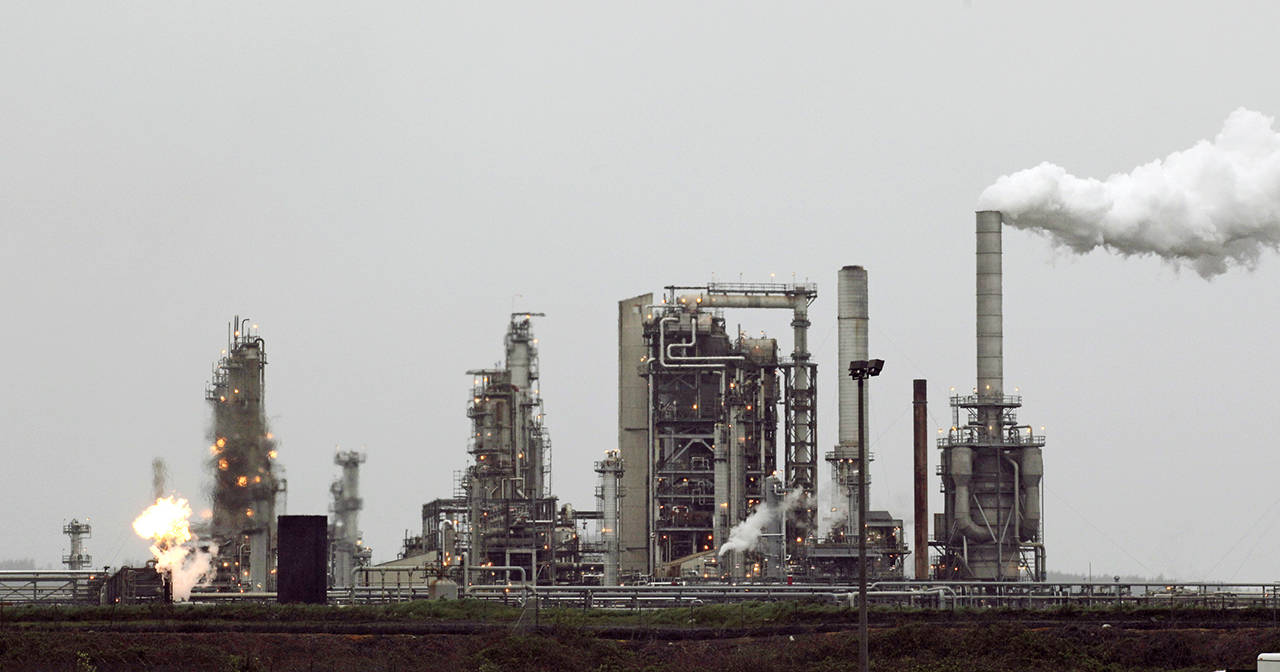By The Herald Editorial Board
Thanks to of our state’s hydropower-blessed grid, much of the electricity we use results in a relatively limited amount of carbon-dioxide and other greenhouse gases that contribute to climate change and pollute the air we breathe.
That means transportation — the cars, trucks and buses that move us and our things — are the largest source of those greenhouse gases in Washington state.
With the goal of reducing the amount of carbon and other pollutants emitted by those vehicles, much of the West Coast — California, Oregon and British Columbia — has established a “low-carbon fuel standard,” a program meant to reduce the carbon intensity of the gas and diesel that flow into our tanks.
All, except for Washington state.
That might change with legislation proposed in the House that could receive a floor vote soon. House Bill 1110 would require a reduction in greenhouse gases from gas and diesel fuels, 10 percent below 2017 levels by 2028 and 20 percent by 2035. The program would establish a trading system where deficits for carbon-intensive petroleum fuels could be offset by a range of less carbon-intensive fuels such as ethanol, bio-diesel, even used cooking oil that can be blended into petroleum fuels; hydrogen for fuel cells; and the promotion of electric vehicles and development of the roadside charging infrastructure to power them.
The legislation is opposed by groups such as the Western States Petroleum Association, which represents refineries and others in the state’s petroleum industry, considering it too costly and regressive because it would add to the price of gas and diesel, and less cost-effective in reducing greenhouse gases than other options, such as placing a price on carbon.
Opponents have pointed to a recent report by the California Energy Commission that its low-carbon fuel standard has added nearly 17 cents to the price of a gallon of gas. That state’s Legislative Analyst’s Office estimates that will rise to 41 cents by 2030.
But, as the car ads tell us, our mileage may vary.
Supporters of the legislation, among them Climate Solutions, Audubon Washington and the Union of Concerned Scientists, don’t dispute that the standards have increased fuel prices but respond that those costs, along with volatility in the low-carbon fuels market, should subside as clean fuels technology advances. Washington, where many of these fuels already are being produced, should now be benefiting from their production in terms of reduced carbon emissions and other pollutants.
WSPA and others contend that the technology, in particularly the production of ethanol from cellulose — from corn stalks rather than the grain, and other agricultural and wood wastes — hasn’t advanced as quickly as first expected. Supporters counter that, even so, the legislation is flexible and broad enough in the eligible sources of fuels to allow for the production needed to support the program. Washington’s addition to the low-carbon standard, they argue, could further development of those technologies.
It also could help support efforts that would lower the costs of electric vehicles and build out the infrastructure of charging stations that will make plug-in electric cars a viable transportation option for more drivers.
To the contention that carbon pricing — either a cap-and-trade program or a carbon tax — would be more cost-effective, that, too, is true. But, as concerns grow over climate change, the right course isn’t a matter of choosing between the two but using both a clean-fuels standard and carbon pricing to advance the reduction of those emissions.
California, along with its low-carbon fuel standard, also uses a cap-and-trade system. Oregon’s legislature is considering a cap-and-trade program this year. And British Columbia uses both its clean-fuel program and a carbon tax.
Even as the fuel-efficiency of our vehicles has improved in recent years — standards that the Trump administration and the auto industry now want to scale back — the amount of carbon emitted by the extraction and production of petroleum fuels has actually increased. The Union of Concerned Scientists, in its 2016 report on clean fuels, notes an increased reliance in extracting petroleum from Canada’s tar sands and through fracking, which use processes that are heavily carbon-intensive on their own, can produce up to five times the amount of carbon as a conventional barrel of crude.
We’re losing ground — or rather breathable air — with the increase in carbon emissions from every barrel of fuel produced from those dirtier sources of petroleum.
There’s public support for a clean-fuels standard. A poll taken shortly after the November defeat of I-1631 found 54 percent support a low-carbon fuel program; and 50 percent support even among those who considered I-1631’s carbon fee as flawed.
Washington state now needs to join the rest of the West Coast in encouraging the development of cleaner-burning fuels and electric transportation. It likely will mean an increased cost at the pump for most vehicle owners, but the costs have been there all along; we’ve just been paying for inexpensive gas through a loss of life and health caused by respiratory diseases and from the worsening effects of climate change.
Talk to us
> Give us your news tips.
> Send us a letter to the editor.
> More Herald contact information.

























